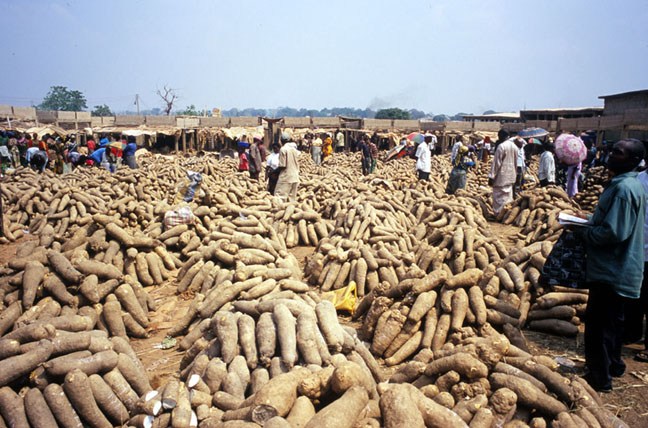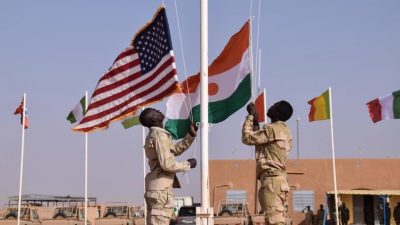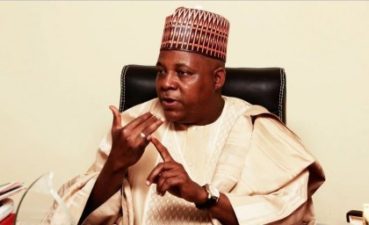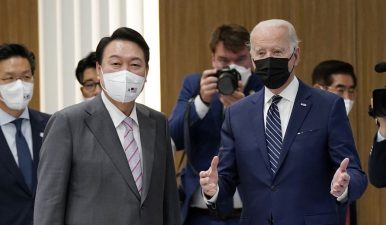By BASHIR ADEFAKA
“There is no amount of effort President Muhammadu Buhari would invest to make people happy that will pave to anything because those who are crying that they are hungry know that they are up to something and will never cease to cry of hunger until after February 2019 presidential elections when their political sponsors finally lose out, get crashed and then there will no longer be politicization of people’s welfare and national security in our land and life will become bearable.”
It was a discussion one of the nights in the last five days that led to the mention about how Nigerians cry of hunger and why President Muhammadu Buhari should help to resolve that as a way of justifying the love of the poor masses for him and their loyalty to him.
That came from the co-discussant, who said, “those who are working hard among themselves to take power from President Buhari should know that they are only making an effort in futility” but that, “the only thing Baba should just do is to make Nigerians happy”.
Pretending to understand what he meant by “making Nigerians happy”, I said, “You must be talking about the cry of hunger which has been the basis for complaint by people who chose not to see anything good about the President or anything that he has done in the last three and a half years that he came to power”. He said, “You got me right Sir.”
I then opened another chapter to the discussion thus, “Can I tell you something?” He said, “Go ahead Sir”. And I said, “On the issue of hunger that you are talking about, let me tell you without fear of contradiction that there is no hunger in Nigeria. What you have is the people themselves, knowingly or unknowingly doing the bidding of the opposition politicians who never for once admitted that 15.3 million Nigerians – who voted them out of power on grounds of their unpardonable corruption, impunity and wicked brewing of insecurity – were right or that they took the right decision, are the ones causing themselves all the hardship. How do you explain a bottle water seller who, because she has bought ice block of N150 for two crates of her items decide to hike the price of a bottle of water in the Lagos/Ogun axis from N50 to N100? How do you explain a commuter transporter in Lagos who, because he sights crowd at bus stop decide to hike a distance of N50 to N200 and Oshodi to Kola, Moshalashi Alagbado that should be N100 now becomes between N300 and N700? How do you explain such commuter bus runner who because of hold up increases fare charges indiscriminately? If he is so selfish to consider earning from one trip what he should make from four trips, has he considered who augments the painful increment his wicked, unsocial misbehavior has imposed on his passenger; so much that passengers then result to trekking a long distance?”
I then began the bare facts without much ado about analytical way of trying to convince him by calling his attention to how the grip of the pro-corruption politicians – democratically ousted from power, on the economy particularly in the trades, commerce and industries – is the core reason Nigerians are facing the hardship they talk about. I however postulated that the good thing working for President Buhari in the whole of the scenario is that, the number of people who say “Yes, we know we are hungry but we know how it came to be with us and we are not getting over it” is far higher than of those who refuse to see the cause and who would never want to listen to any reasonable explanation being given.
My co-discussant, who confessed that he had been a very active partaker in Peoples Democratic Party (PDP) from its start in 1998 till 2003 to know enough that PDP never won any single election in Nigeria but used force and money to get to power, was quick to fall for my submission. He said, “Sir, you don’t need to go too far on this. You are very correct. I have gone to Idiroko market where Cap Rice that is sold N18,000 in Lagos markets is brought from (call it fayawo or something) and I discovered that is N9,800 in that market of source.”
He continued, “I bought one bag and brought it home here in Lagos. I asked my wife to measure to know the number of Derica tin that are in that supposedly 50kg bag and she got 75. Sir, there is no bag of rice that is sold in any Nigerian market largely in Southern Nigeria where this cry of hunger is only heard, which contains 75 Derica tins. All you will find is 64 tins. Do you know what I found out?” He asked and he moved on, “In Owode market, they already have a particular place there with their own Nigeria-arranged bags ready where they distort the rice content which they even insist must be brought in through land border despite government’s ban on same. They open the 75-derica tin bag of rice, remove 11 tins to make it 64-derica tin, do mix different types of rice in the content and bring it either to Sango-Ota market area or Alagbado, Iyana Ipaja, Oshodi, Orile Iganmu or any part of Lagos and sell same shortchanged bag of rice for N18,000 that is the Cap Rice found only in super markets, Shoprite, etc, because others are N14,000. That is after they have removed 11 Derica tins from it and they have diluted the cap rice with other types of rice and now stitched it back as if it is fresh on arrival.”
The discussion went on and on and we both asked each other: “How are we even sure that we are safe from the kind of rice content that is smuggled through the land border which is the main product that is sold in the Sango-Ota, Ogun/Ile Epo, Lagos states axis to Nigerians? You then have a situation where in one particular bag of rice you have three types of rice content that you are eating. How are we sure that one of the types is not the expired product? Are we not actually in danger for buying rice in any Southern Nigerian market in this country particularly in Lagos and Ogun areas where people, despite knowing that we now have Nigerian rice, yam, cassava, beans, wheat, and so on in abundance, insist on the smuggled rice?” We both asked each other.
I then took up the talk by reminding him how Nigerian farmers, who are farmers of rice, yam, cassava, wheat, even cocoyam, all of which are now in abundance to feed not only Nigeria but also other African countries, are now posting videos and photographs of their farm produce in particularly Northern markets and showing how happily they now live their lives as a result of support they get from this sitting government in the country and how they are making good money from exporting those same farm produce their fellow Nigerians have denied ever existed.
I said, “Do you know that what we hear them say is that Nigeria does not produce rice and President Buhari is banning rice import? Now, the question is, did Buhari actually ban rice import? But the answer is no. All that he has done is identifying the risks of relying continuously on foreign food and then, immediately after coming to power, devising the means of reducing those risks by empowering Nigerian farmers to be able to produce for Nigerians what they eat and use and then ban importation of rice through land borders in order that importation of rice from foreign land into the country will come through trusted channel duly examined on arrival at Ports, which is sure way of ensuring quality control and hygiene of food intakes among the people he leads as President and which should be commendable being that it is a long time ago an average Nigerian knew when his government was so concerned about his good life.”
I continued: “Today, we don’t need to be told that the food we eat in Nigeria is now more from our own farmers than produced by farmers in foreign land.” My co-discussant shook his head in disappointment at the attitude of Nigerians towards their own country and themselves.
Just before I go on narrating what transpired between that co-discussant and myself, let me quickly put to all of us that the European, Asian and western societies which we, Nigerians, hail for things working there got to that level because their PEOPLE took sanity of country seriously, put their nations first and so their PUBLIC or CIVIL SERVANTS work without abuses of powers or opportunity; their MEDIA work without sentiment and refuse to commit professional misconducts. I must however at this implore all to join me in saluting the Colonel Hameed Ali-led Nigeria Customs Service (NCS) for wielding the will power to resist the temptation of N150 million with which their attempted bribe givers intended to make them compromise the lives of Nigerians by allowing their illegally imported pharmaceutical materials access into the nation’s health delivery sector.
Having made that acknowledge, let us ask ourselves, what is the attitude of public or civil servants to civil responsibilities in Nigeria? All the potholes, for instance, that are causing accidents on our intra and inter-state roads, are there not supposed to be offices of Ministry of Works in each state whose officials should know what happens on those roads before they get so dilapidated? Are there no materials and fund approving officers in those offices to enable engineers and artisans working on road maintenance fix those potholes? But no; they prefer to watch the roads get worsened such that, after several months of causing hardship on the people, causing deaths, government that put them there now begins to run around with the headache of making pronouncements on contracts award, approving funds and seeking physical cash to back up its fund approval.
This one pays Nigerian public and civil servants because it is where they make their “devilish wealth from”. If you are a Nigerian public or civil servant, you should be ashamed of yourselves when people complain about how things are not working but praise foreign countries where things work. Those foreign nations work because their public or civil servants are responsible and awake every moment to their duty as nation’s citizens.
Now back to my narrative, I then said, “Therefore, there is no amount of effort President Muhammadu Buhari would invest to make people happy that will pave to anything because those who are crying that they are hungry know that they are up to something and will never cease to cry of hunger until after February 2019 presidential elections when their political sponsors finally lose out, get crashed and then there will no longer be politicization of people’s welfare and national security in our land and life will become bearable.”
“Huuuum!” He screamed. I said, “Yes! That is the fact. Can you imagine, much as there is nobody in Nigeria who is not touched by the stoppage of business as usual where free money is no longer available to the few who claim to be the Owners of Nigeria and the multitude of contractors who never executed contracts they got and for which they got paid, the only part of Nigeria from which people are crying of hunger is Southern Nigeria. In the North, the people have always been believers in Nigeria and have therefore never relented in being the food makers for the country and never complained about any bad situation except that they find a way out and pray to Almighty Allah to make things better for them.”
My co-discussant, who himself is a North Central person, said, “Sir?” I said, “Yeees!”
I continued: “If you go to any Lagos market, you will be ashamed of yourself to ask them for Nigerian rice because the reply you will get will disappoint you. Don’t forget that it is in this Lagos that some rice sellers said they do not sell Nigerian rice because it is full of pebbles. That is even those among them who still tell the truth by half. Others would throw your question back at you: where in Nigeria is Nigerian rice planted?”
This is the depth of compromise that people in the trades, commerce and industry sector of our economy in the stated part of the country have gone. They are the ones who deliberately pretend not to see that Nigeria now has food abundant enough to feed Nigerians and even export but insist on imported rice – whereas rice is not the only food that is eaten in this country, Nigeria has more than ten different types of very highly nutritious food – and they even still dilute this imported rice and hike his price just to make things hard for their fellow citizens and this is the reason for the hunger that they cry about.
Otherwise, a tour of other parts of the country will convince any sane and patriotic person that Nigerians are more comfortable in terms of food security, now under Buhari Administration, than it had been in the last 16 years before the President came to power which was the period that agriculture finally collapsed in the country. Today, there are diverse programmes through which the government has lifted farmers, who are now farming not just with hoes and cutlasses but mechanized farming system and still empowered with money beginning from N500,000 for each farmer equipped also with fertilizers, pumping machine to wet crops during dry season farming and ready market for their produce after harvest.
More disgusting is that, when government resorted to exporting rice, beans, wheat and yam, these same people, who have played leading role in saying Nigeria produced no food, began to cry: “How can they export food when Nigerians are hungry and are dying of hunger?” Since they have been saying people are hungry and are dying of hunger, there has never been a single case of one dead body found and it was linked to lack of food. What you have had is armed robbers arrested and when asked, “Why?” He said, “It is Satan”. It means, Nigerians who have lived on the attitude under discussion need to work more on themselves to know that not Nigeria but themselves are problem of themselves.
On a final note, may I call on the Muhammadu Buhari Administration to do just one thing: Price Control. Only this way you can finally destroy the evil tendency of Nigerians who take pleasure in causing hardship for fellow citizens so long it will satisfy their political collaborators and lead to quick wealth for them. This must cut across the whole economic sector: air, water, rail and water transportation, food and other consumables in the market, oil and gas, health and school, power distribution, housing, other goods and services sector. This is vital and it will work.




